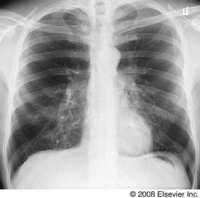
– “I think this is a way to get control of an issue,” Dr. Miller said. “They can control the discussion by keeping it internal.” Miller said he already had a bad taste in his mouth after a 32-page training letter came out from the Veterans Affairs Department detailing environmental concerns — with his findings of constrictive bronchiolitis removed from the original draft after it was reviewed by military officials“.
By Kelly Kennedy in the Army Times
A civilian doctor who diagnosed more than 50 soldiers with constrictive bronchiolitis after they were exposed to burn pits in Iraq and Afghanistan has been told that Brooke Army Medical Center in San Antonio will handle his patients from Fort Campbell, Ky., from now on.
Dr. Robert Miller, associate professor of allergy, pulmonary and critical care medicine at Vanderbilt University Medical Center, said he worries handing the cases over to the Army means the problem will disappear from public view.
“I think this is a way to get control of an issue,” Miller said. “They can control the discussion by keeping it internal.” But Col. Lisa Zacher, pulmonary consultant to the Army surgeon general, said she greatly admires Miller’s work, and that the change came purely for business reasons.
“I think we’re trying to be open,” she said. “We’re trying to be transparent. It’s no reflection on his work — to me, it’s just a business decision.” In 2003, Fort Campbell soldiers began returning home from Iraq complaining of shortness of breath and saying they could no longer run fast enough to pass their physical fitness tests. But pulmonary-function tests came back normal, as did scans, X-rays and exercise tests.
Doctors at Fort Campbell sent the soldiers to Miller to try to solve the mystery. He decided to perform lung biopsies — an inpatient operation that involves surgery to pull out small pieces of the lungs.
All but a few soldiers came back with diagnoses of constrictive bronchiolitis, a rare disease that causes the lung’s smallest airways to narrow. It can be diagnosed only through biopsy.
Because there is no treatment, some doctors worry that a biopsy is an unnecessarily invasive procedure. But Miller offered each soldier the option because a diagnosis can mean better medical benefits down the road.
“People thought biopsy was a bit aggressive, but it’s the only way to diagnose them,” Miller said. “I know that unless these guys are biopsied, they’re not going to get what they deserve.” And, he noted, he is only 30 miles from Fort Campbell — much closer than San Antonio, where Brooke is located.
At first, each soldier had been exposed to a sulfur fire in Mosul, Iraq. But as Miller continued the biopsies, soldiers who had been exposed to burn pits — footballfield-sized open trash pits in Iraq and Afghanistan — but not the sulfur fire came forward with the same symptoms. Biopsies showed they also had constrictive bronchiolitis.
Miller said he already had a bad taste in his mouth after a 32-page training letter came out from the Veterans Affairs Department detailing environmental concerns — with his findings of constrictive bronchiolitis removed from the original draft after it was reviewed by military officials.
“That didn’t sit too well with me,” he said. “I thought that was a problem.”
Seeking out more research
Zacher, who months ago began calling for pulmonary function baseline tests before troops deploy to Iraq or Afghanistan, said the Army does want to take ownership of the problem, but that’s only part of the reason Campbell soldiers must now go through Brooke.
On Oct. 1, the Army eliminated the Great Plains medical region, which means Fort Campbell now falls under Brooke Army Medical Center’s region. Brooke has plenty of pulmonary specialists and the capacity to take care of the troops, Zacher said.
She said Brooke now also has a pulmonary fellowship program, so they’re looking for cases and have stood up some research protocols to look at lung function of post deployment soldiers.
“I commend Dr. Miller for getting this going and bringing attention to the issue,” Zacher said.
The two have met, and each had good things to say about the other. And the government does seem to be reaching out for more research. Dr. Anthony Szema, chief of the allergy section at the VA Medical Center in Northport, N.Y., found a higher rate of asthma in veterans who deployed compared with those who did not.
He has been approved to work on a study at VA looking at breath test results of soldiers who deployed compared with those who did not, as well as by age, gender and smoking status.
And he said Army officials called July 29 to talk about a grant that he applied for to do more research. “I think we really want to take the lead in looking at this issue, but also to cooperate with VA and civilian medical facilities,” Zacher said.
ATTENTION READERS
We See The World From All Sides and Want YOU To Be Fully InformedIn fact, intentional disinformation is a disgraceful scourge in media today. So to assuage any possible errant incorrect information posted herein, we strongly encourage you to seek corroboration from other non-VT sources before forming an educated opinion.
About VT - Policies & Disclosures - Comment Policy



